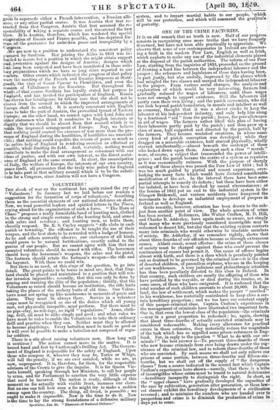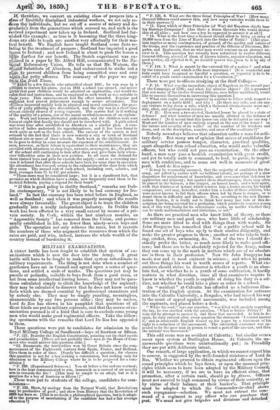ONE OF THE CRIME FACTORIES.
IT is an old remark that no truth is new. Half of our progress consists in recognizing once more truths that we have fornAerly
discerned, but have not been able praotically to appreciate. We observe that some of our contemporaries in Ireland are discover- ing a fault in the modern Poor Law, English as well as Irish, which neglects to make any use of the industrial elements placed at the disposal of the parish authorities. The reform of our Poor Law, starting from the inquiries of 1833, proceeded on the ground of drawing a hard line between the independent labourer and the pauper ; the reformers and legislators of those days having been, in part justly, but also unduly, impressed by the abuses which had mingled the two classes and merged the independent labourer in the pauper. From various social changes, the analysis and
explanation of which would be very interesting, farmers had gradually reduced the wages of labourers, until those wages were not enough to support existence. Still the labourers did partly earn their own living ; and the parish economists, who did not look beyond parish boundaries, in morals and intellect as well as economy, thought that it was a clever stroke to keep the , labourer at his independent industry, and only help him along by a fractional " aid " from the parish ; hence, the poor allowaace in aid of wages. The farmers rather liked this plan of having , • their labourers partly paid by the parish ; and thus grew up a class of men, half supported and directed by the .parish, half by -
the farmers. They became wretched creatures, in whose name every kind of parish corruption was developed ; while they dragged on a miserable existence, half starved physically, wholly starved intellectually,—almost beneath the contempt of those who looked down upon them. Amongst such a class " morals" were, of course, a subject that transcended the power of intelli- gence ; and the parish became the centre of a system as repulsive as it was economically ruinous. With the purpose of sharply cutting off these abuses was passed the Poor Law of 1834 ; but it was too much guided by partial and recent experience, over- looking the many facts which would have dictated considerable modification of the act. In the interval there have been some .
partial attempts to remedy its defects ; but these have been either too isolated, or have been checked by casual circumstances; as
the famine of 1842 put an end to the industrial system in the Glasgow Bridewell, and various accidents have hampered the movements to develope an industrial employment of paupers in Ireland as well as England.
Quite recently, however, attention has been drawn to the sub-
hect from another point of view. The whole question of crime as been revised. Reformers, like Walter Crofton, M D. Hill, and Charles B. Adderley, have again made us aware, not simply that many who were previously considered incorrigible may be
redeemed to decent life, but also that the existing system converts many into criminals who would otherwise be tractable members of society. Mr. Adderley, if we remember rightly, shows that about three-fourths of our offenders become so through extraneous
causes. Ablati comet, oessat effectus : the crime of these classes of society must be charged against those who could prevent the
continuance of causes but permit it. One cause of offence begins almost with birth, and there is a class which is peculiarly pointed out as destined to be governed by the criminal law—it is the class of deserted children, of parentless orphans, who are in the keeping , of our workhouses. A very judicious and philanthropic attention has thus been peculiarly directed to this class in Ireland. In
that country, sueh children are mostly the offspring of those who have perished by the wayside, or died during the famine, or, in some oases, of those who have emigrated. It is reckoned that the total number of such children amounts to about 20,000. In Eng- land, the law of settlement, which makes the pauper " ascribed" to his workhouse, has materially contributed to keep alive a cer- tain hereditary pauperism ; and we too have our constant supply of this pauper-criminal class. Captain Crofton's experiences in the management of criminals have illustrated two important facts. One is, that even the lowest class of the population—the criminals —may in a great proportion be redeemed ; he, again, showing that about three-fourths of actually convicted criminals may be considered redeemable. Making every allowance for practical errors in these estimates, they materially reduce the magnitude of the task which has so appalled some prison-reformers in Eng- land. For, in reply to the question " What to do with our cri- minals ?" the best answer is—To prevent three-fourths of those who now become criminals from ever being drawn under the cog- nizance of the criminal law, and to reform three-fourths of those who are convicted. By such means we shall not only relieve our prisons of some portion, between three-fourths and fifteen-six- teenths, but we shall cut off the supply of " the dangerous classes" from a source indicated in the second fact which Captain Crofton's experiences have shown—namely, that there is a tribe of incorrigibles whose crime must be traced to natural deficiencies , —hereditary incapacity to distinguish the right. In short, as the " upper classes" have gradually developed the capacities of the race by cultivation, generation after generation, so these low- est classes exhibit the hereditary developments of a civilization reversed; and to minimize the numbers who are handed over to ' pauperdom and crime is to diminish the production of crime in days yet to come. It, the fore, we convert an existing class of paupers into a /lass of ealthily disciplined industrial workers, we not only re- deem th individuals, but we cat off a source of misery and de- gradatio. from the generations which succeed us, and such is the revived xperiment now taken up in Ireland. Scotland had fur- nished tie example ; so true is it becoming that the three king- doms arse able to teach one another very effectually for their mu- tual ben fit. We English have taught Scotland some facts re- lating the treatment of paupers ; Scotland has imparted a good n lo the ; and now Ireland is about to push the lesson a e further for our benefit. The Scotch experiment was ex- ailed in a paper by Mr. Alfred Hill, communicated to the Na- f.11/ Reformatory 'Union. He tells us that Mr. Watson, the .•Fiff Substitute of Aberdeen, had endeavoured to strike out a p&p to, prevent children from being committed over and over split .for. petty offences. The summary of the paper we copy fin4 theIrish Times. Aided by a few friends who subscribed about 1001., he was soon in a p (ion to mature his plans, and in 1841 a school was opened, and notice gisUlthat poor children would be admitted on application, and would re- eadeitood and instruction, and be employed in such work as was suitable to tkeig: years. This announcement had the effect intended. Regular and sgliment. food proved inducement enough to secure attendance. The e Wren improved rapidly both in physic and moral condition ; the proc- t ea of petty pilfering was discontinued, and the city was in a short time
i
almost entirely cleared of young vagrants. The system had in it nothing oldie qualify of a prison, nor of the moral unwholesomeness of an orphan- age. Work and lessons alternated judiciously, and the children were sent home at night that family ties should not be interfered with. A girls school was some time after established in Aberdeen on a similar plan. A com- mittee of ladies undertook its superintendence, and it has been found to work quite as well as the boys school. The success of the system is best evinced by the fact that there is now scarcely a city or town of Scotland without one or more of these schools. Such work as the children are able to do goes to defray in some measure the expenses of the establishment. As acton, however, es their labour is equivalent to their maintenance, they are provided with situations as shop-boys, servants, messengers, &b., the patrons of the school still continuing to look after them and give them help when- ever difficulties arise in their new position. In all cases the demand for these trained boys and girls far exceeds the supply—and as a crowning suc- cess it is found that after those schools have been for some time in operation the attendance has lessened, owing to the exhaustion of the class from which they came. The annual cost of each school, including rent, salaries, and food, averages from 71. to 111. per scholar. "These sums may be considered large; but it is a significant fact, that parishes on which children have a claim, now frequently send them to In- dustrial Schools, paying a stipend for their board.
"If this is good policy in thrifty Scotland," remarks our Dub- lin contemporary, "it is not likely to be bad economy for Ire- land." In fact the economy has been tried before in England, as well as Scotland ; and when it was properly managed the results were always favourable. The great object is to train the children gradually into a really independent industry. In Dublin this work has been effected to a very small extent by means of a pri- vate society. In Cork, within the last nineteen months, an " Apprentice Society" has removed from the Union, and perma- nently established in life, no fewer than ninety-seven boys and girls. The operation not only relieves the rates, but it recruits the numbers of those who augment the resources from which the rates are paid, and who, indeed, increase the whole wealth of the country instead of burdening it.



























 Previous page
Previous page